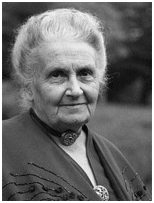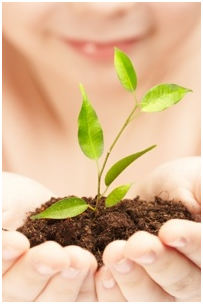[box type=”shadow”] “The most important period of life is not the age of university studies, but the first one, the period from birth to the age of six. For that is the time when Man’s intelligence itself is being formed.” (Dr. Maria Montessori, The Absorbent Mind)[/box]
 Montessori education is based upon the theories and practices of Maria Montessori, a physician and educator born almost a century and a half ago (1870-1952). Dr. Maria Montessori’s visionary understanding of children remains relevant even in our modern times. Dr. Montessori recognized that children are born with absorbent minds that have the ability to take in knowledge from their environments. Dr. Montessori also discovered that it is at the crucial first years that children begin to lay the foundation for physical, social, emotional and cognitive development.
Montessori education is based upon the theories and practices of Maria Montessori, a physician and educator born almost a century and a half ago (1870-1952). Dr. Maria Montessori’s visionary understanding of children remains relevant even in our modern times. Dr. Montessori recognized that children are born with absorbent minds that have the ability to take in knowledge from their environments. Dr. Montessori also discovered that it is at the crucial first years that children begin to lay the foundation for physical, social, emotional and cognitive development.
Children first develop their understanding of the world through sensorial exploration of the immediate environment. Using as many of their five senses as possible, children learn by processing information obtained from concrete objects and stimuli. The Montessori classroom is designed and organized with the appropriate materials, educational techniques, and observations which support the natural development of children. Multi-sensory materials in the areas of practical life, sensorial, language, math, geography, science, and cultural studies invite the child to touch, think and experience.
Children are innately motivated by their own desire for knowledge. In their classrooms, they discover a world of mutual respect, beauty, consistency, and learning. The Montessori education focuses on each child individually. Children progress through the increasingly challenging “work” at their own unique pace. The teacher’s role as facilitator is to observe and guide the children toward activities that will impart greater proficiency of skills. The children begin to gradually build upon their repertoire of fundamental experiences, leading them into abstract thinking and concepts. Entrusting young children with the freedom and opportunity to think, make choices and care for themselves within a structured environment instills a sense of self-confidence, self-worth, and responsibility. The Montessori experience is, in essence, “education for life.”
